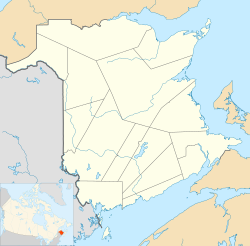Harvey, New Brunswick
| Village of Harvey Station | |
|---|---|
| Village | |

Harvey Station Today
|
|
| Location of Harvey Station, New Brunswick | |
| Coordinates: 45°43′45″N 67°00′25″W / 45.72917°N 67.00694°WCoordinates: 45°43′45″N 67°00′25″W / 45.72917°N 67.00694°W | |
| Country |
|
| Province |
|
| County | York County |
| Parish | Manners Sutton Parish |
| Government | |
| • Type | Village council |
| • Mayor | Winston Gamblin |
| • Deputy Mayor | Ronald Goodine |
| Area | |
| • Land | 5.74 km2 (2.22 sq mi) |
| Population (2011) | |
| • Total | 363 |
| • Density | 203.3/km2 (527/sq mi) |
| • Change 2006-11 |
|
| Time zone | Atlantic (UTC-4) |
| • Summer (DST) | Atlantic (UTC-3) |
| Area code(s) | Area code 506 |
| Website | http://www.village.harvey-station.nb.ca |
Harvey Station (2011 pop.: 363) is a village in York County, in the Canadian province of New Brunswick.
Situated at the southeastern end of Harvey Lake, the village is approximately 35 km southwest of Fredericton. The lake was originally known as Bear Lake, then Big Cranberry Lake for a time, and finally after 1869, as Harvey Lake, when the community that eventually would become Harvey Station was established at the intersection of the "Great Road" and the newly built railway line (see below).
The area south of the village includes the Parish of Manners Sutton (2011 pop.: 1,806), which was the original Harvey Settlement founded in 1837.
The village traces its name to Harvey Settlement (parish of Manners Sutton). Harvey Station was the name for the railway station that was built at the extreme northern fringe of Harvey Settlement when the European and North American Railway (Western Extension) was constructed in 1869 to connect Saint John with Vanceboro, Maine. Several merchants, hoteliers and other businesses established themselves near Harvey Station, thus moving the settlement's business district.
Harvey Settlement, owed its origin to a party of Northumberland and Borders immigrants, recruited for Stanley (a community in York County north of the Saint John River) by the New Brunswick Land Company. Upon their arrival in 1837 they found the Company commissioner absent, and discovered that the Company's inducements had been exaggerated. They appealed to the Legislature and to the Governor, Sir John Harvey, to be permitted to purchase land outside the Company's territory. They were given work on the new St. Andrew's Road and the right to draw lots upon it, in the community that would bear the Governor's name. The party of 154 had arrived at Saint John from Berwick-upon-Tweed aboard the Snow Cornelius of Sunderland, and hailed mostly from northern Northumberland, many being from the town of Wooler or its rural environs commonly known as Glendale.
...
Wikipedia

